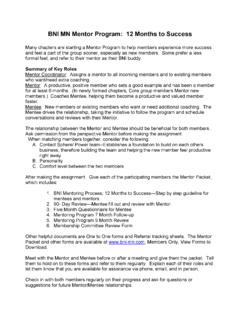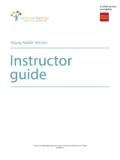Transcription of How To Build Self Esteem In Your Child Through Martial Arts
1 How To Build Self Esteem In your Child Through Martial Arts A Gift for Friends and Family of this Martial Art Academy 2010 Full Contact Online Marketing Inc. all rights reserved 2 Table of Contents Part I How to Build Self Esteem in your Child Through Martial Arts Respected Role Models Giving the Child Attention Discipline Responsibility Recognition Promoting Feelings of Success Part II What does our school have to do with Self Esteem ? The Lesson of Respect Communication And Attention Discipline Responsibilities Recognition and Praise Success Part III Self Esteem Checklist 3 Part I How to Build Self Esteem in your Child Through Martial Arts Self- Esteem is the way we feel and think about ourselves. Webster s dictionary defines it as a confidence and satisfaction in belief in oneself [and] self-respect . Self- Esteem affects everything we do in our lives.
2 Healthy self- Esteem promotes a positive Yes I Can attitude, as opposed to a defeatist attitude of No I Can t . Nowhere is this concept more important than in the life of a young Child . Children begin life helpless and dependent on their caregivers. In order to grow up to be happy and productive, they cannot stay that way. They must learn that they have a degree of control over their environment, and eventually, that they have more and more control over their own lives. They have to learn to have an attitude conducive to successful interaction with everything and everyone around them. They must learn to believe in Unfortunately, too many children today worry about failure. They doubt their strengths, feel insecure, unfocused, are overly critical of themselves, and often don t believe that they can achieve 4 the best in life if they put themselves to the task. Poor self- Esteem ends up negatively affecting everything they think, say, or do.
3 On the other hand, children who feel good about themselves will produce positive results. Helping your children grow up with strong character and self- Esteem is arguably the most important task of parenthood. The Child with good self- Esteem has the best chance of becoming a successful and happy adult. Fortunately, self- Esteem can be dramatically improved in a Child who, with the guidance and encouragement of his parents, commits himself to the task of personal self-development. Respected Role Models Self- Esteem is the armor that helps protect kids from the demons of life: alcohol, gangs, drugs, and destructive behavior. There are several things parents can do to instill and nurture a sense of self- Esteem within their Child . First, the parents themselves need to feel good about themselves, for children pick up on subtle messages about their own self worth from your body language and the way you talk about yourself.
4 If you are often openly self critical in front of a Child , he will learn to be self-critical. Because parents have preeminent importance in a Child s life, and children model after their parents. By clearly demonstrating your own self worth, your Child will respect you and learn to respect himself. Giving the Child Attention An important way you can teach your Child his own value is by listening to him. When you listen to someone and give him or her your full attention, 5 you in effect are telling them that you value them and what they have to say, and that they are important to you. Allow your Child to express how he feels, and let your Child finish what he is saying before offering your point of view. The Child will learn by example to listen to others the same way you listen to him. Discipline Another important factor contributing to a Child s self Esteem is discipline.
5 Discipline can be described as any instruction or training that corrects or molds a person s mental faculties and moral character. Children raised without discipline have lower self- Esteem and tend to be more dependent, achieve less, and feel that they have less control over their world. Proper discipline can be the means of creating a safe, supportive environment where learning can take place. Discipline begins with a good relationship between the parent and Child , in which the Child knows exactly what is expected of him, and knows that the consequences of misbehaving are reasonable and predictable. Children need and want to know what is expected of them. They thrive on the image of themselves achieving that expectation. They anticipate the approval they will receive. It is this expectation and approval that motivates a Child to learn to read or to learn the multiplication tables. And not only does approval motivate a Child , it also gives him something to take along with him: A sense of being worthy.
6 6 Responsibility Responsibility is the next key ingredient to healthy self- Esteem . It is a great boost to self- Esteem to feel that a person can contribute, and that the contribution is important. Added responsibility increases the confidence a Child has in his ability to make it in the world. Responsibility requires goal setting, and sets the foundation for the achievement of goals, which feels good. Recognition Parents should note their Child s abilities, talents, skills, and interests, and find occasion to frequently praise the Child . Give your Child the opportunity to show his ability. Display the work your Child has done, such as paintings, stories, and trophies. Doing this will reinforce your Child s positive behavior. Make sure that the praise is honest. For example, if your Child did well recently on a math test, but is usually in the middle of the grade curve, don t tell him he is the best math student in his class; do tell him how proud you are of how well he did on the test.
7 Kids are more perceptive than we adults sometimes give them credit for. In giving your Child honest praise, he will learn to value his talents and to see himself as a capable person. By seeing your Child in a positive way, he also learns to see himself in a positive way. Even when a Child is struggling with one or more areas in his life, if he has confidence in himself, he can still feel OK in spite of the difficulty. He knows he has talents and that he should take pride in these and gain strength from them. 7 Promoting Feelings of Success Finally, promote feelings of confidence and success. When a Child learns something new or faces a challenge and succeeds, his self- Esteem grows. Provide the conditions that will encourage your Child to try new experiences. Make sure the Child knows what to expect out of the experience. Let him practice the skills that will help him in the endeavor.
8 Have patience with him, and allow him to proceed at his own pace in anything new. Pressure to perform before a Child is ready may make him feel intimidated. Let the Child know it is OK to fail, as long as he tries his very best, and let him know that with most things, if at first you don t succeed, try, try again. 8 Part II What does our school have to do with Self Esteem ? The Lesson of Respect One of the early lessons that your Child will learn at our school is that of respect. The Child is taught to respect the instructor as well as the other students, the school and himself. He learns that even opponents preparing to engage in combat can respect one another. Having good role models is important in the development of a Child . Martial arts training starts as a relationship between the Child and the instructor, a respected adult role model, who lets the Child know exactly what is expected of him.
9 Children strive to meet the expectations that people they look up to have for them. When a Child accomplishes these expectations he feels capable and valuable nurturing his self Esteem . Communication and Attention At our school our instructor s job includes communicating with the students on their progress. The instructor spends time focusing on the individual needs of each student so that individual progress is made. In addition, our school is a wonderful place for your Child to meet new friends with similar interests. It is a great environment in which children can practice communication and social skills. Discipline In Martial arts training, discipline is also an important ingredient. It takes discipline to consistently focus on improving one s skill. It takes discipline to 9 consistently come to practice and to concentrate on the work. Martial arts focus on positive action and the accomplishments of mental as well as physical feats.
10 It is the philosophy of Martial arts that both the body and the mind must be disciplined in order to overcome the obstacles that hinder one s growth. Discipline is essential to developing healthy self- Esteem . Another benefit that comes from this disciplined approach is the improved ability to concentrate on achieving a goal. This increased concentration carries over into other areas of the Child s life, including higher performance in school work and team sports. Responsibilities In addition, as a Child gains in rank in our school system, other students begin to look to him for guidance. He learns to feel confident in his abilities. He learns to effectively communicate what he knows to others and makes new friends. Although mastering a Martial art can be fun and rewarding, it is not easy. A Martial art requires much preparation and practice. This value of preparation and practice instills a sense of responsibility in a Child .






